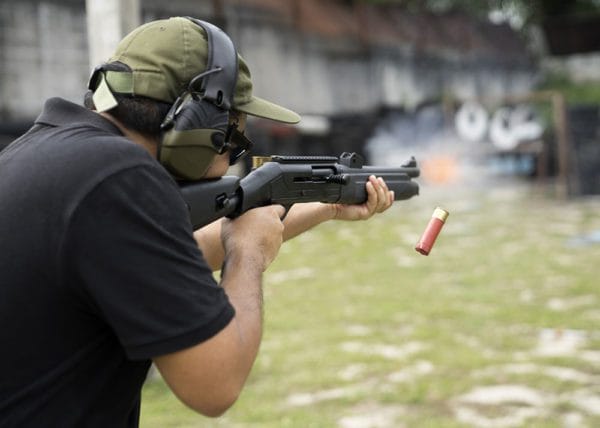
U.S.A. — A Vermont “environmental” court judge has ordered that shooting range owner Daniel Banyai be arrested and held in state prison until he or the town he’s been feuding with for years over zoning issues – Pawlet, Vermont, population 1,386 – destroy all the structures on his private range.
This week, Judge Thomas Durkin, of the environmental division of Vermont’s superior court issued a rarely seen writ of mittimus – a type of arrest warrant – to all law enforcement officers in the state.
“BY THE AUTHORITY 0F THE STATE OF VERMONT, any sheriff or constable in this state is directed to arrest Daniel Banyai, and remit him to the custody of the Commissioner of Corrections, to be thereafter confined until he or the Town causes the subject property to be brought into compliance with the March 5, 2021, Order, as described in the February 8, 2023 Contempt Order, to the court’s satisfaction,” Judge Durkin wrote.
As of Thursday night, Banyai was at home, waiting to be arrested.
“Please help me,” he said in a text. “I am fighting all alone.”
Banyai and Pawlet town officials have been feuding over his 30-acre range, which Banyai calls Slate Ridge since he purchased the property in July 2013. Initially, his neighbors complained about the noise. Town officials said Banyai built structures on his land without applying for the proper zoning permits.
Banyai countered by saying that his range is safe and includes a “firearms education center” and an organic farm. Besides, he teaches students of all types for free, he said.
None of that mattered to Pawlet town officials. After their initial zoning efforts failed, they sued Banyai in Vermont’s environmental court, which ordered Banyai to remove the unpermitted structures and earthen berms within 135 days. Banyai ignored the ruling, and in February the environmental court held Banyai in contempt of court. He has been racking up civil fines at the rate of $200 per day ever since.
“Respondent has demonstrated a willfulness, perhaps even an enthusiasm, for disregarding the Town’s Bylaws, this Court’s Orders, and the authority of the Judiciary,” Judge Durkin wrote in his February contempt-of-court order.
In his writ of mittimus issued Thursday, Judge Durkin explained that he offered Banyai a “compliance schedule to give Respondent final opportunity to bring his property into compliance.”
“Respondent has failed to do so. As such, imprisonment is an appropriate coercive remedy in these circumstances,” Durkin wrote.
Lawfare
“A lot of people are floored that Daniel will end up in prison over a zoning violation,” Banyai’s attorney Robert J. Kaplan told the Second Amendment Foundation’s Investigative Journalism Project Thursday night.
Kaplan said that there are additional factors that aren’t fully explained in the court documents.
“A lot of people in the community didn’t like the fact that Daniel offered people a place to shoot, and it’s a dynamic facility, not just a flat range,” Kaplan said. “Vermont has a lot of leftists. Guns scare them and people moving around with guns really scares them. The people in the town formed a posse to drive the new guy out of town – over zoning issues.”
Kaplan pointed out that after municipal and environmental laws failed, Pawlet officials approached Vermont State Senator Phillip Baruth for help. He quickly sponsored a bill making it a felony to operate a “paramilitary training camp” within the state.
Baruth, a liberal Democrat from Burlington, admitted he introduced the bill after Pawlet officials complained there was no state law that they could use to force Banyai to shutter his private range on his private property.
In May, Vermont’s Gov. Phil Scott — a Republican — signed the bill into law.
4071. PARAMILITARY TRAINING PROHIBITED
(a) A person shall not:
(1) teach, train, or demonstrate to any other person the use, application, or making of a firearm, explosive, or incendiary device capable of causing injury or death, or techniques capable of causing injury or death to persons, if the person knows or reasonably should know that the teaching, training, or demonstrating is intended to be used in or in furtherance of a civil disorder; or
(2) assemble with one or more other persons for the purpose of practicing or being taught, trained, or instructed in the use, application, or making of a firearm, explosive, or incendiary device capable of causing injury or death, or in techniques capable of causing injury or death to persons, if the person knows or reasonably should know that the practicing, teaching, training, or instruction is intended to be used in or in furtherance of a civil disorder.
“Vermont enacted the anti-paramilitary training law based entirely on the false premise about what was happening at Mr. Banyai’s facility,” Kaplan said. “People in the legislature imagined what might have been happening at Mr. Banyai’s facility – training for a revolution against the government – none of it was. They made this crazy law banning the ability to train with firearms in the state – all for something that never existed.”
Federal lawsuit
Kaplan said Banyai had no choice but to file a federal civil rights lawsuit, which alleges violations of his Second Amendment and Fourteenth Amendment rights. The defendants include the Town of Pawlet, Judge Thomas S. Durkin and 20 unnamed defendants identified as John and Jane Does, because their identities are not known.
In his suit, Kaplan points out prejudicial statements made by numerous officials – including Vermont’s governor – condemning Banyai and his range. The statements were published in The New York Times, This American Life radio program, and numerous other media outlets.
“These stories, which typically contained false, misleading, or inaccurate information about Plaintiff and Slate Ridge, were published frequently in order to tarnish Plaintiff’s reputation, stir unfounded and irrational fear and anxiety among residents and Vermont officials, and to pressure local government to aggressively intervene against the Plaintiff and Slate Ridge,” the lawsuit alleges. “Ultimately, the pressure imposed by a coalition of anti-gun activist residents, political actors and other activists worked. Plaintiff’s validly issued permit was revoked based on a convoluted and constitutionally defective application of zoning law, which was inexplicably upheld by the Vermont Supreme Court. Defendants, emboldened by media adulation and political support, aggressively sought to prosecute and punish Plaintiff by way of civil enforcement to compel Plaintiff to remove the building and shooting ranges he constructed on his property. However, Defendants’ conduct was not limited to just shutting down Slate Ridge. Through the civil enforcement action, Defendants unlawfully sought to force the deconstruction and removal of unrelated farming structures on Plaintiffs property. Far from questioning the significant overreach, abuse of power and egregious interference of private property rights, local residents, the media, and high-ranking government officials, including Governor Phil Scott, encouraged and cheered the violation of Plaintiffs civil rights every step of the way.”
Kaplan sought an injunction to prevent any harm from occurring in state court while he pursued federal relief, which is pending.
In his federal lawsuit, Banyai is seeking:
- A finding that Defendants’ conduct constitutes a violation of Plaintiffs Second Amendment and Fourteenth Amendment rights under the United States Constitution.
- An order terminating the permanent injunction filed against the Property prohibiting any firearms related activity.
- An order reinstating the June 2018 Permit.
- An order enjoining and restraining Defendants from enforcing all prior, current or future orders requiring the deconstruction and removal of Plaintiffs gun ranges, berms and farm structures.
- Awarding actual, nominal, punitive, compensatory, and consequential damages in an amount to be determined at trial.
- Awarding reasonable attorney’s fees and costs expended in connection with the prosecution of this action pursuant to 42 U.S.C. § 1988.
- Awarding such other relief as this Court may deem just, proper, and equitable.
A GiveSendGo account has been established for Daniel Banyai, which seeks to raise funds for his legal defense.
Pawlet’s nonresponse
Neither Pawlet Town Board Chair Michael Beecher, nor Pawlet Town Attorney Merrill Bent, or First Constable David Ricard, Sr., responded to multiple calls or emails seeking their comments for this story.
This story is presented by the Second Amendment Foundation’s Investigative Journalism Project and wouldn’t be possible without you. Please click here to make a tax-deductible donation to support more pro-gun stories like this.
About Lee Williams
Lee Williams, who is also known as “The Gun Writer,” is the chief editor of the Second Amendment Foundation’s Investigative Journalism Project. Until recently, he was also an editor for a daily newspaper in Florida. Before becoming an editor, Lee was an investigative reporter at newspapers in three states and a U.S. Territory. Before becoming a journalist, he worked as a police officer. Before becoming a cop, Lee served in the Army. He’s earned more than a dozen national journalism awards as a reporter, and three medals of valor as a cop. Lee is an avid tactical shooter.

from https://ift.tt/rVvetcs
via IFTTT

No comments:
Post a Comment